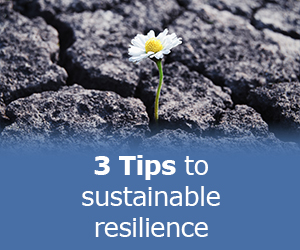Understanding your resilience and how to protect it
Category: Tips and Advice
Publish date: 31/07/2023
 Organisations are increasingly being shaped by a period of volatility and uncertainty. Ongoing recessionary pressures, supply chain disruption, changes in working arrangements, skills shortages, and technological advancements have all combined and forced organisations to re-group and re-strategise. And it’s because of this that many businesses will be looking to recruit people based on their ability to handle change and uncertainty, i.e., the more resilient you are, the more in-demand you are.
Organisations are increasingly being shaped by a period of volatility and uncertainty. Ongoing recessionary pressures, supply chain disruption, changes in working arrangements, skills shortages, and technological advancements have all combined and forced organisations to re-group and re-strategise. And it’s because of this that many businesses will be looking to recruit people based on their ability to handle change and uncertainty, i.e., the more resilient you are, the more in-demand you are.
Having worked in the military, there’s no doubt that you’ll possess some level of resilience – a career within the Armed Forces often necessitates it. However, a career transition is widely recognised as one of the most stressful life events we ever experience; one that can really drain our levels of resilience. Leaving the military, being faced with uncertainty, and coping with the emotions of change can all take their toll.
And so it’s important that you recognise the emotional impact of transition, and that you understand how to maintain your wellbeing throughout the process. Resilience is more than just a highly-desired quality, it’s a key part of your personal toolkit in coping with daily life – and it’s crucial that you protect it.
1. Focus on your wellbeing To succeed in your career transition, you need to make sure that you’re in good shape, both physically and mentally. The uncertainty around your future can often leave you exposed to prolonged feelings of stress, and so it’s crucial that you take time out of your transition to focus on yourself and do the things that you enjoy; whether that’s sports, reading a book or spending time with family and friends. There’s nothing more important than your health, and your job search can always be put on hold to prioritise your wellbeing.
2. Set realistic goals and timelines There’s no right or wrong way to transition out of the military, and nobody is expecting you to have all the answers straight away. Take time to really reflect and understand what it is you want to do next and set a realistic timeline for achieving your goal; considering any time needed to undertake vocational training/acquire a new qualification. A career transition cannot be rushed, and everyone’s journey will be different – so don’t place undue pressure on yourself to secure employment within a certain timeframe.
3. Focus on your circle of control Not everything in your transition will be within your control. You have no say as to whether an employer chooses to progress your application through to interview, or whether one of your peers secures employment faster than you. Focusing on these elements will only leave you feeling frustrated. Instead, focus on what you can control, i.e., improving your CV following feedback from your CTP Career Consultant, or attending a webinar to better understand how to improve your LinkedIn profile. As long as you know in yourself that you’re doing everything you possibly can to succeed, nobody can ask for more.
These are just a few ways you can enhance your levels of resilience in response to the stressors that come with career transition. You’ll find a wealth of additional resources and support available within myCareerPath, such as ‘Starting your career with resilience’, ‘Practical tips for developing your resilience’ and ‘The resilience EDGE model’.
Plus, if you ever feel like you just need to talk to someone, your Career Consultant will always be on-hand to support you.